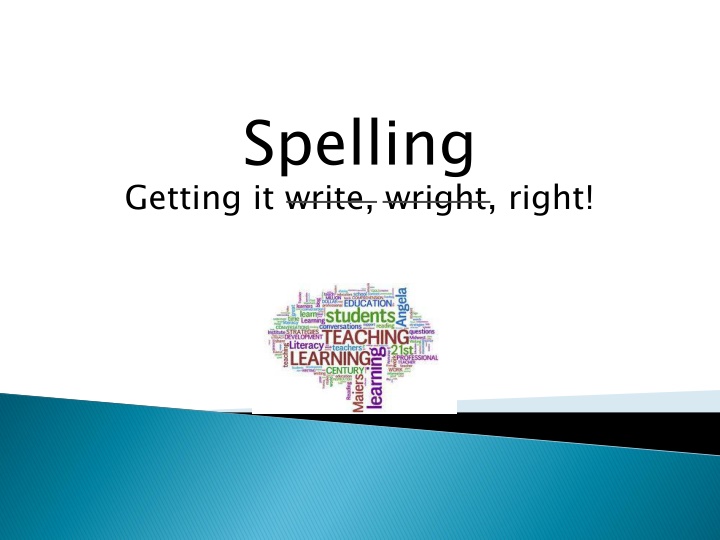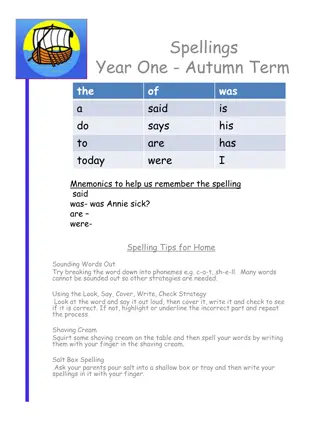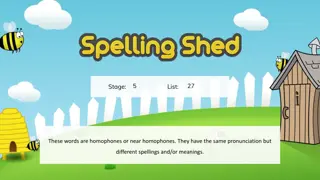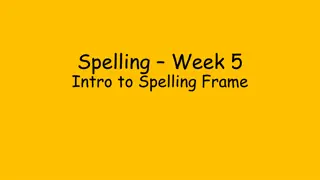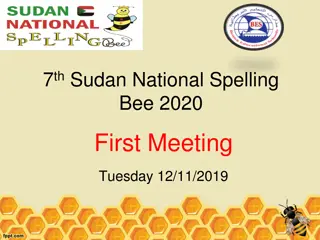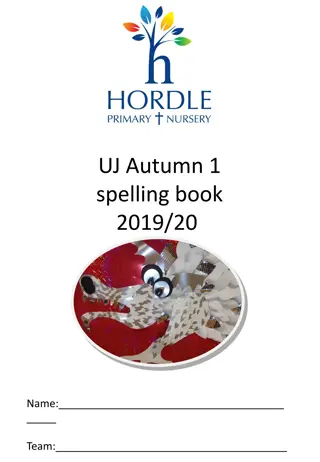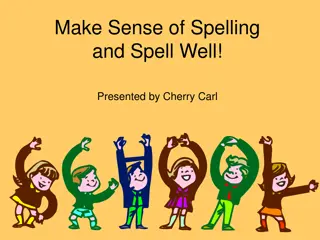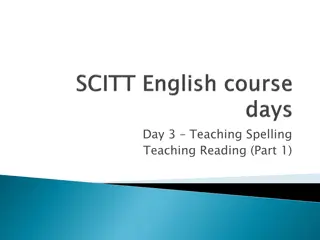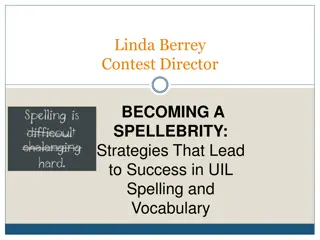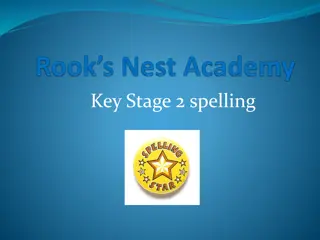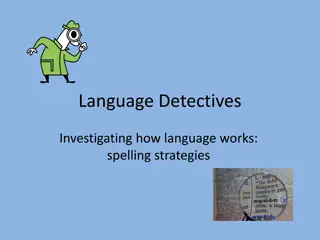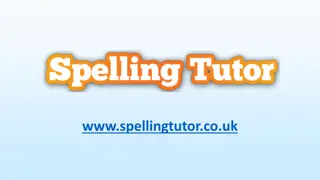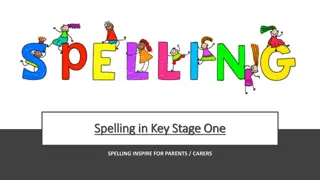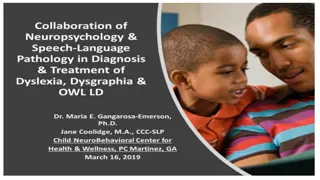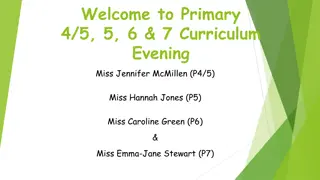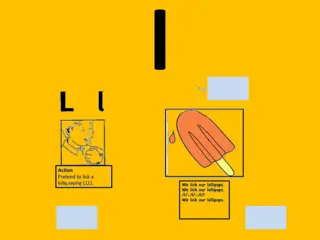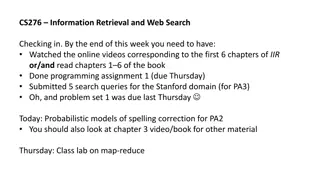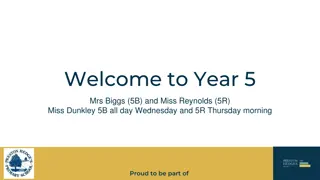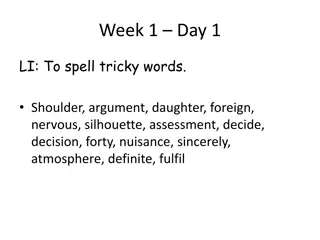Enhancing Spelling Skills in the New Primary Curriculum
Implications and changes in spelling education, support strategies for parents, analysis of letter order impact, diagnostic testing for progress tracking, increased expectations on spelling rules, word origins, and demanding word lists, focus on phonics and compound words, rules for verb tenses, plurals, adjectives to adverbs, suffixes, and more.
Download Presentation

Please find below an Image/Link to download the presentation.
The content on the website is provided AS IS for your information and personal use only. It may not be sold, licensed, or shared on other websites without obtaining consent from the author.If you encounter any issues during the download, it is possible that the publisher has removed the file from their server.
You are allowed to download the files provided on this website for personal or commercial use, subject to the condition that they are used lawfully. All files are the property of their respective owners.
The content on the website is provided AS IS for your information and personal use only. It may not be sold, licensed, or shared on other websites without obtaining consent from the author.
E N D
Presentation Transcript
Spelling Getting it write, wright, right!
Aims To know the implications for spelling within the new primary curriculum To understand how spelling is being taught in school and how this is changing To have the opportunity to ask questions To know how you can support spelling at home
Task In a puiltacibon of teh New Scnieitst it siad you cuold jublme all teh letetrs in a wrod adn as lnog as teh frist adn lsat were the smae, reibadailty wolud hadrly be aftcfeed. My ansaylis did not cmoe to mcuh beucase of teh thoery at the tmie but raserceh sugsegts we may hvae smoe pofrweul palrlael prsooscers at wrok, which seepd up regnicoiton. We olny need the frist and lsat letetrs to spot chganes in meniang.
GH is P, as in hiccough OW is O, as in bow BT is T, as in doubt A is A, as in acorn PT is T, as in pterodactyl EAU is O, as in beau GH OW BT A PT EAU
Diagnostic tests were carried out to ascertain levels Weekly tests have taken place Children s progress has been tracked and adjustments have been made Profile of spelling has been raised Parents have been supporting children in learning spellings at home
Significant increase in expectations across all year groups Greater focus on spelling rules and conventions Greater focus on word roots and origins Word lists are particularly demanding Skills need to be embedded
In line with Phase 5 phonics Words with alternate pronunciations of digraphs and trigraphs Compound words playground / blackbird Adding endings jump / jumper / jumping Prefix un : unkind / unfriendly Common exception words tricky words school / friend / where
Rules: Verb tenses : hope / hoped / hoping Plurals : flashes / boxes Changing adjectives to adverbs : quick quickly / careful carefully Suffixes : happiness / joyful / payment / painless Adding er & est Rules:
Adding vowel suffixes to words with more than one syllable e.g. beginner Suffixes: ation, ly, sure, ture, ous Prefixes: un, dis, mis, re, sub, inter, super disappear although guard recent knowledge experience business accidentally experience reign
Endings: tious, cious, cial, ance, ancy, ably, ibly, Use of a hyphen Homophones Letter string ough Silent letters pronunciation prejudice convenience mischievous nuisance amateur guarantee parliament
Limitations to stand alone spelling tests: -Children don t always commit spellings learnt for a test to their long-term memory -Some get 10/10 but then fail to spell these words correctly in their writing -Gives teachers little information about the spelling skills children need to develop New guidance from the government: - Higher emphasis on the teaching of spelling rules and strategies - 50% of the marks in the end of Key Stage 1 & 2 SPAG tests are awarded to spelling questions New guidance from the government:
Each class will focus on a weekly rule / pattern and dedicated spelling time will take place every Friday Children will bring home words which are linked to the pattern / rule they have been taught Tests will take place the following week Spelling will feature more heavily in daily literacy sessions Children will be given further opportunities to self correct spelling through dictionaries
Children who are currently working below the expected level for their year group will take part in spellings interventions looking at words which are more appropriate for them All other children will look at rules for their year group, we will differentiate through breadth of words following the same rules e.g. tion: nation relation recommendation
Sounding out by breaking the word into phonemes Look, cover, write, check Split the word into syllables re-mem-ber Mnemonics e.g. People Eat Orange Peel Like Elephants or OU Lucky Duck (would/could/should) Identify words within words e.g. rat in separate Making links with word meaning e.g. sign signal signature Dictionary skills
Websites: Topmarks & Woodlands Junior spelling games Familiarise yourself with the statutory words for each year group Encourage your child to have a go Remember it is fine to make mistakes, it is important that children given the skills of how to correct them Any Questions? Any Questions?
